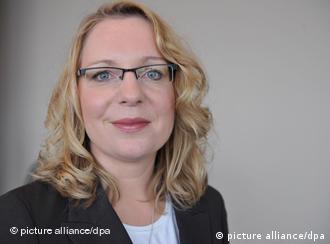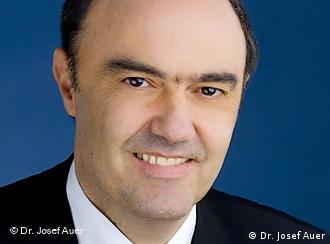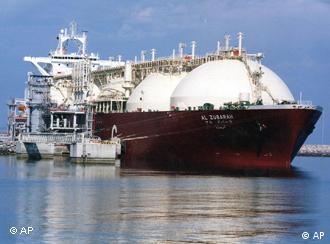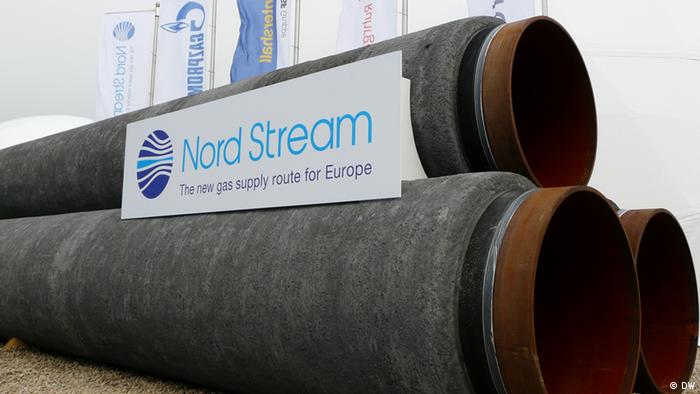The controversial Nord Stream pipeline provides Russian gas directly to Germany, bypassing Poland and Ukraine. But as its second line opens, it is running far below capacity.
The Nord Stream pipeline project is nearing completion. After the planned ceremonial start-up of the second line planned for October 8, the capacity of the Russian-European gas pipeline will reach its expected 55 billion cubic meters (appr. 2 trillion cubic feet) per year.

Claudia Kemfert: Nord Stream must be evaluated over the long term
German experts welcome the construction of the line. It allows Russian gas company Gazprom to increase its exports to Germany and other countries of Central and Western Europe. In addition, customers will be served by bypassing transit countries
"Basically, from the aspect of security of supply, it can be assessed positively because it has direct access to Russian gas deliveries," Claudia Kemfert of the German Institute for Economic Research (DIW) in Berlin said in an interview with DW. She noted that there had been delivery stoppages in the recent past related to the transit of gas through Ukraine.
These interruptions greatly unsettled consumers at the time, said Josef Auer, an energy expert with Deutsche Bank Research in Frankfurt. Auer evaluates the macroeconomic and psychological significance of the first line of the Nord Stream pipeline extremely positively. It began operation in November 2011. The now imminent opening of the second line makes the situation on the European energy market "even less tense than it already was."
'Too expensive'
"Basically, from the aspect of security of supply, it can be assessed positively because it has direct access to Russian gas deliveries," Claudia Kemfert of the German Institute for Economic Research (DIW) in Berlin said in an interview with DW. She noted that there had been delivery stoppages in the recent past related to the transit of gas through Ukraine.
These interruptions greatly unsettled consumers at the time, said Josef Auer, an energy expert with Deutsche Bank Research in Frankfurt. Auer evaluates the macroeconomic and psychological significance of the first line of the Nord Stream pipeline extremely positively. It began operation in November 2011. The now imminent opening of the second line makes the situation on the European energy market "even less tense than it already was."
'Too expensive'

Josef Auer: Second Nord Stream line reduces market skittishness
At the same time, both experts emphasize that Russian gas, tied to the price of oil, is too expensive. This is a problem both for the consumer and for Gazprom. The inflexible pricing policy of the Russian company, the experts said, was the reason for the low utilization of the first line of the Nord Stream pipeline. Jens Müller, spokesman for the pipeline operator, acknowledged that in the first eleven months of its operation, it achieved on average only 30 to 40 percent of maximum capacity. During this time, some nine billion cubic meters of gas were pumped through the line.
The fiscal balance of the first year of operations of the Nord Stream pipeline, the experts say, should not be very satisfactory for Gazprom.
"The risk is even higher for the second line," Auer said, adding that if Gazprom does not deliver at reasonable prices, then there is a risk that the capacity of the pipeline will not be fully exploited.
Economic feasibility of the pipeline in danger
The fiscal balance of the first year of operations of the Nord Stream pipeline, the experts say, should not be very satisfactory for Gazprom.
"The risk is even higher for the second line," Auer said, adding that if Gazprom does not deliver at reasonable prices, then there is a risk that the capacity of the pipeline will not be fully exploited.
Economic feasibility of the pipeline in danger

Tankers like this could soon bring natural gas supplies from the US
Kemfert says there is currently a gas glut on the international market: "Russia is an important supplier, but there are more and more competitors on the market, and that pushes the gas prices down. This could also affect the cost-effectiveness of a mammoth project such as the Nord Stream pipeline." She believes that the pipeline will run at a loss for Gazprom for many years.
However, Kemfert says the project must be evaluated over the long term. "We will need gas in the future. In the next few decades, the gas supply in Europe will become increasingly important, so the Nord Stream pipeline will also be increasingly important."
However, the supply of gas on the world market will also continue to increase, Kemfert said, noting the possibility that shale gas from the United States could be supplied in liquid form to Europe. Auer agrees, even setting a date: 2015, the year a gas liquefaction plant will go into operation in the southern US. He believes that the competitiveness of the Nord Stream pipeline could be seriously affected by US liquid gas supplies and thus advises Gazprom to quickly move to a more flexible pricing policy. Later, it will be difficult to beat the competition, he said. dw de
However, the supply of gas on the world market will also continue to increase, Kemfert said, noting the possibility that shale gas from the United States could be supplied in liquid form to Europe. Auer agrees, even setting a date: 2015, the year a gas liquefaction plant will go into operation in the southern US. He believes that the competitiveness of the Nord Stream pipeline could be seriously affected by US liquid gas supplies and thus advises Gazprom to quickly move to a more flexible pricing policy. Later, it will be difficult to beat the competition, he said. dw de
- Date 07.10.2012
- Author Andrey Gurkov / sgb
- Editor Greg Wiser


No comments:
Post a Comment